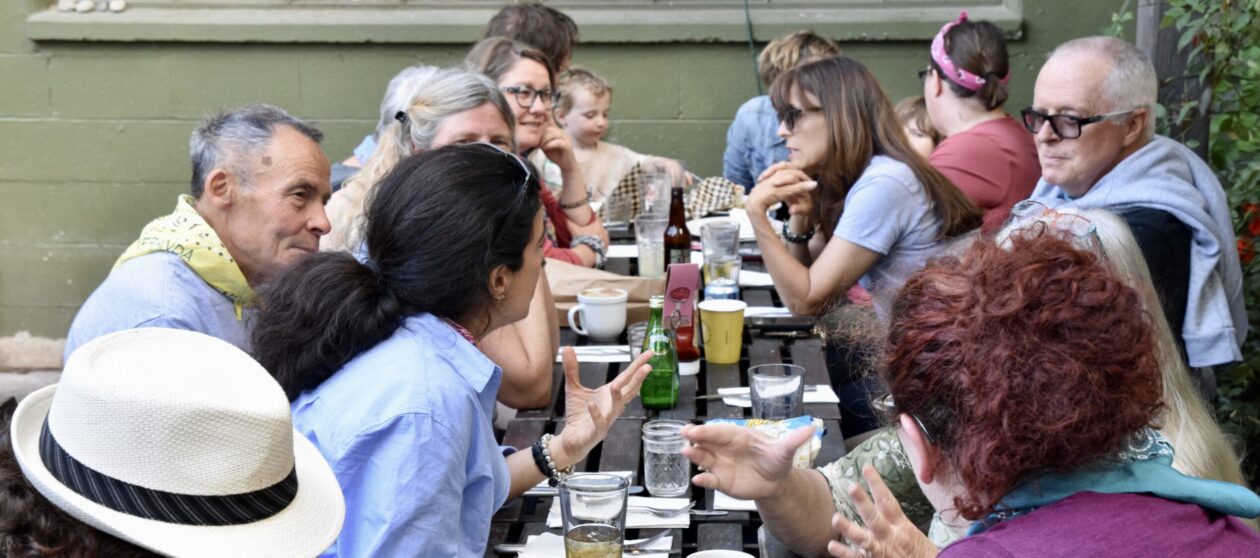
I don’t usually mention people last names on the blog but I do want to copy something that Steve Watkins put up on FaceBook. Steve just came out with a new book called Pilgrim Strong and he had his first book signing over last weekend. Let me see if I can pull this off, it is all quite good:
After a very long weekend and a four-hour drive home yesterday I went to bed with a book I found in a great little used book store. Its author is Eugene Peterson who wrote The Message bible translation. Peterson’s introduction to this little book includes three of the best pages of text I’ve read in a lifetime. I hope you’ll take a moment to read through it.
The Introduction from Eugene Peterson’s, Stories of Jesus.
“When Jesus opened his mouth and spoke, what came out, more often than not, was a story. He spoke in other ways also: he prayed, preached, taught, denounced, conversed, mourned. But stick around long enough and you are sure to hear a story.
Story is an act of verbal hospitality. Good storytellers invite us into a world that is “other” and larger than the one we ordinarily live in. All of a sudden we see things and people we had never noticed before. We hear words and sentences that make sense of what we’ve had intimations of, but couldn’t quite “place.”
Jesus was a good storyteller His stories draw us into a reality where we find ourselves in touch with the very stuff of our humanity. We discover that there is something MORE to life, something that we didn’t quite see or understand before.
The stories of Jesus are large and with a sense of God. Interestingly, though, Jesus rarely mentions God in his storytelling. What he does is bring us into a world suffused with God, a world permeated with God’s unspoken and unseen presence, and he does so in such a way that we know this is the world we were made for, the world where we most truly belong.
Jesus’ stories are brief. They range from a simple metaphor embedded in a sentence to a broadly sketched portrayal of a personal quest, dilemma, or situation. None of these is blatantly religious. Jesus employs ordinary things and persons as subject matter: salt and light, farmers and merchants, travelers and banqueters, money and seeds, parents and children.
Jesus throws these simple little stories into our ordinary lives and we think, “What is this doing here?” They appear so commonplace, so insignificant. We expect big things from a teacher the stature of Jesus — bold headlines, eternal truths, religious thunder. But these Jesus-stories are so unpretentious. More often than not, one or another of them lodges unnoticed in our consciousness and then, unexpectedly, begins to release insights, create new perspectives, shift the very ground beneath us so that we find ourselves reeling, reaching out for support.
When the story is allowed to complete its work, the sole support we find ourselves grabbing onto is God.
Jesus was once asked by one of his friends why he told stories. He responded that he told stories ‘to create readiness, to nudge people toward receptive insight.” His stories, besides inviting us into a larger world than we presently inhabit, pull us into it as participants. These are not stories that entertain, that let us sit back on a bench watching the action. We BECOME the action. These stories don’t tell us something new. they involve us in what has been sitting right in front of us for years but that we hadn’t noticed, hadn’t thought was important, hadn’t considered to be connected to us and our lives.
And then suddenly, we do notice. The story wakes us up to what is there, and has always been there. Without leaving the world we work and sleep and play in daily, we find ourselves in a far larger world. We embrace connections and meanings and significance in our lives far beyond what our employers and teachers, our parents and children, our friends and neighbors, and all the so-called experts and celebrities have told us for so long.
But Jesus not only told stories. He IS the story. The stories he told are trailheads into the story he lived and lives. Any one of the stories he told can bring any one of us into the story itself. Consider yourself invited.”
Eugene Peterson
Well that was a lot. I am going to make sure to read that a time or two more to make sure that it sinks in. Eugene is a very insightful guy. The translation of the Bible that I use most these days is his Message. It is a paraphrase and not a word for word translation. It holds the story important over the literal meaning of individual words in the text. Does that make sense?
OK, off to walk in a moment. Have to fill the bird feeders as I walk. They cleaned me out while we were gone on our junket. Junket away from the juncos.
Also very exciting, Cris from Buenos Aires is coming in on Wednesday and will be here through Saturday. Coincidentally I am reading the Pilgrimage by Mark Schriver, a bio of Pope Francis and the early part is full of info about that city which I know little about. Tell you more soon. Love, Felipe.

Thank you, as always, Phil.
Your readers can get to know Eugene Peterson at https://onbeing.org/programs/eugene-peterson-entering-into-what-is-there/
He is one of my go to people. I try and read The Message when entering a bible study to get some ‘comfort food’ on my plate.
Thanks Ron ~ yes, I find him very helpful. Felipe.